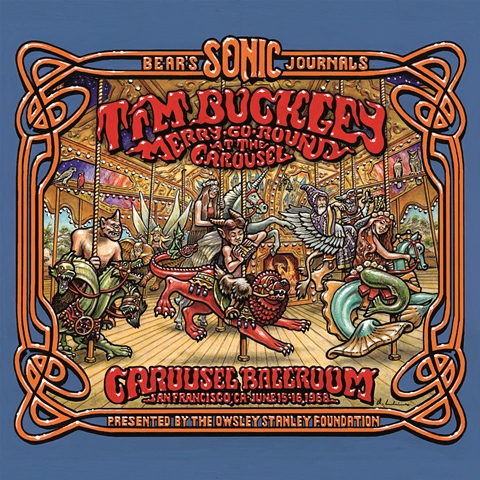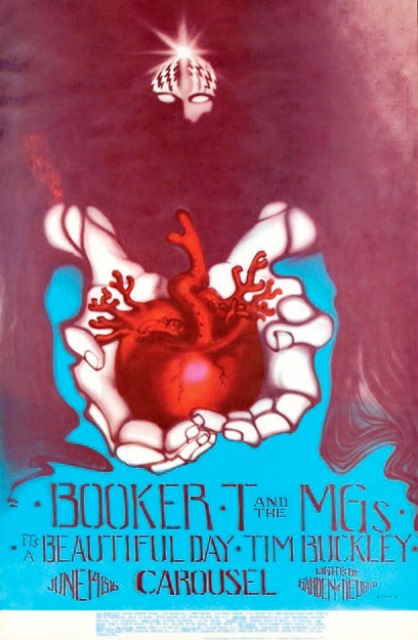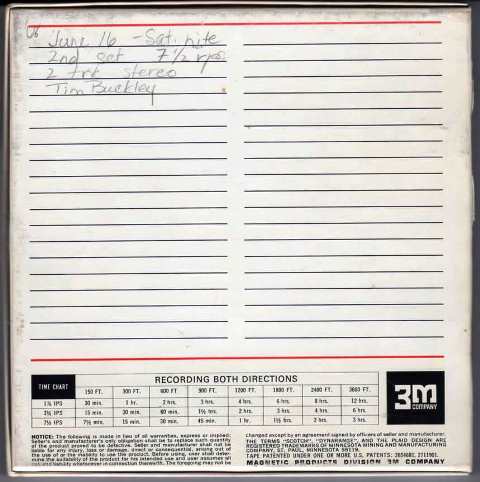Reissue CDs Weekly: Tim Buckley - Merry-Go-Round at the Carousel | reviews, news & interviews
Reissue CDs Weekly: Tim Buckley - Merry-Go-Round at the Carousel
Reissue CDs Weekly: Tim Buckley - Merry-Go-Round at the Carousel
Essential first-ever release of previously unheard live shows from 1968

Anyone in San Francisco on 15 and 16 June 1968 would have had a tough choice if they wanted to see live music. On Saturday the 15th, Big Brother & the Holding Company and The Crazy World of Arthur Brown were playing The Fillmore. That night, The Charlatans were on at The Straight Theatre.
At the Carousel, the Booker T combo was supported by local stars It’s A Beautiful Day. Billed third and on first was Tim Buckley, who’d issued Goodbye and Hello, his second album, the previous August. Happy Sad, his next, would be recorded in December 1968 and released in April 1969.
 It seems strange at this remove that Buckley was bottom of the bill, yet it’s a fair bet some of the Carousel’s audience were specifically there to see him. Being signed to the hip imprint Elektra Records marked him out and, locally, he wasn’t an unknown quantity, In March 1968, The San Francisco Examiner reviewed him at The Circle Star Theatre and said “Buckley has a strange and memorable vocal fashion. He uses his flexible voice (with frequent falsetto) and eerie original lyrics to cast a musical spell which sets the tone for each of the trio's long numbers. His seeming lack of lyric continuity, from such mysterious lines as ‘Where's the Jim Crow section of the merry-go-round...’ to the wondrous and fascinating 'Hallucinations' concluding medley can provide impressive artistic satisfaction for mature listeners.” Booker T & the MG's and Buckley don't spring to mind as complementary, but perhaps some "mature listeners" were at the Carousel.
It seems strange at this remove that Buckley was bottom of the bill, yet it’s a fair bet some of the Carousel’s audience were specifically there to see him. Being signed to the hip imprint Elektra Records marked him out and, locally, he wasn’t an unknown quantity, In March 1968, The San Francisco Examiner reviewed him at The Circle Star Theatre and said “Buckley has a strange and memorable vocal fashion. He uses his flexible voice (with frequent falsetto) and eerie original lyrics to cast a musical spell which sets the tone for each of the trio's long numbers. His seeming lack of lyric continuity, from such mysterious lines as ‘Where's the Jim Crow section of the merry-go-round...’ to the wondrous and fascinating 'Hallucinations' concluding medley can provide impressive artistic satisfaction for mature listeners.” Booker T & the MG's and Buckley don't spring to mind as complementary, but perhaps some "mature listeners" were at the Carousel.
The arrival of Merry-Go-Round at the Carousel, a previously unissued recording of Buckley’s Carousel shows, confirms that despite the low ranking on the bill there was interest. The shows were taped by the venue’s soundman Augustus Owsley Stanley III, best known for his association with The Grateful Dead and his facilities with making LSD. That Stanley thought Buckley worth recording is significant.
 Aurally, Merry-Go-Round at the Carousel is fantastic. Stanley had placed microphones on the stage and there’s little audience noise. This could pass for an atmospheric board recording. The jazz-minded Buckley is on 12-string acoustic and accompanied by Carter “C.C.” Collins (percussion), David Friedman (vibes) and John Miller (bass). All contributed to Happy Sad, which also featured Lee Underwood on guitar. Collins had been heard on Goodbye and Hello but nothing from the album is performed. “Buzzin’ Fly”, “Strange Feelin’”, “Love From Room 109 at the Islander (On Pacific Coast Highway)” and “Sing a Song for You”, which would all appear on Happy Sad, are performed. There are also versions of “Green Rocky Road”, Fred Neil’s “Merry-Go-Round” and “Wayfaring Stranger”. The impressionistic, lengthy, maybe off-the-cuff “Blues, Love” and the short, vaguely Goodbye and Hello-ish “The Lonely Life” are previously unknown. Buckley and his accompanists played two sets a night: the second sets were recorded.(pictured left, the poster for the Carousel Ballroom shows: there were three – the second and third are on Merry-Go-Round at the Carousel)
Aurally, Merry-Go-Round at the Carousel is fantastic. Stanley had placed microphones on the stage and there’s little audience noise. This could pass for an atmospheric board recording. The jazz-minded Buckley is on 12-string acoustic and accompanied by Carter “C.C.” Collins (percussion), David Friedman (vibes) and John Miller (bass). All contributed to Happy Sad, which also featured Lee Underwood on guitar. Collins had been heard on Goodbye and Hello but nothing from the album is performed. “Buzzin’ Fly”, “Strange Feelin’”, “Love From Room 109 at the Islander (On Pacific Coast Highway)” and “Sing a Song for You”, which would all appear on Happy Sad, are performed. There are also versions of “Green Rocky Road”, Fred Neil’s “Merry-Go-Round” and “Wayfaring Stranger”. The impressionistic, lengthy, maybe off-the-cuff “Blues, Love” and the short, vaguely Goodbye and Hello-ish “The Lonely Life” are previously unknown. Buckley and his accompanists played two sets a night: the second sets were recorded.(pictured left, the poster for the Carousel Ballroom shows: there were three – the second and third are on Merry-Go-Round at the Carousel)
This, then, captures a Tim Buckley who was looking forward. Putting the barque folk-rock of Goodbye and Hello behind him, he is embracing the elliptical jazz influences which coursed through Happy Sad. As such, he is exploratory; in an improvisational frame of mind. Energised too. “Strange Feelin”, “Love from Room 109…” “Sing a Song for You “ and “Merry-Go-Round” bleed into each other in a suite ending with a reprise of “Strange Feelin’”. “I Don’t Need it to Rain” is less free-form than the October 1968 live version on the Copenhagen Tapes album, but Buckley’s voice is elastic and it’s fascinating hearing Miller keeping pace with the changes.
 These two shows are more about twists and turns than the Copenhagen Tapes show and the October 1968 UK concert issued as Dream Letter (Lee Underwood played on that, and the bassist was Danny Thompson rather than Miller). Overall, Buckley seems to be finding his way towards the essence of his newer songs in San Francisco: towards the versions he would record in the studio at the end of the year. Possibly, by being bottom of the bill, Buckley felt no pressure so was able to follow his musical nose to where it took him and his fellow players. (pictured right, the box for the source tape of the 16 June show)
These two shows are more about twists and turns than the Copenhagen Tapes show and the October 1968 UK concert issued as Dream Letter (Lee Underwood played on that, and the bassist was Danny Thompson rather than Miller). Overall, Buckley seems to be finding his way towards the essence of his newer songs in San Francisco: towards the versions he would record in the studio at the end of the year. Possibly, by being bottom of the bill, Buckley felt no pressure so was able to follow his musical nose to where it took him and his fellow players. (pictured right, the box for the source tape of the 16 June show)
This release is not as user-friendly as it could be. Two tracks from the 15 June show – “Happy Time” and “Hi Lili, Hi Lo” – are not included on the disc for space reasons but are available for download. Issuing this as a double CD with one show per disc would have been better.as the music would be in one place, and each show would be a discrete entity. The busy, hippie-homage graphics of the cover and the booklet feel inappropriate – most un-Buckley. It’s hard to discern this as a Tim Buckley album from the cover. The booklet includes five separate pieces of text. Coherence would have come from a single essay focussing on the context, shows and the Buckley of this period. Potential buyers should be aware that Owsley started his tape recorder after each set began, so a couple of opening moments are missing.
Merry-Go-Round at the Carousel further confirms that Happy Sad was preceded by a process of honing. That much had been evident from the Copenhagen Tapes, Dream Letter and the 1999 CD Works In Progress – which documented the sessions birthing Happy Sad. Now, the picture is filled-out even more. “Sing A Song For You” was on the OK Live At The Electric Theatre Co Chicago album, recorded on 3 and 4 May 1968, but these are the earliest known versions of “Buzzin’ Fly”, “Strange Feelin’” and “Love from Room 109 at the Islander (On Pacific Coast Highway)”. In adding vital information to the story of how Buckley created his third album, Merry-Go-Round at the Carousel is essential. Moreover, Tim Buckley is operating at the peak of his powers.
- Next week: What came after Bobbie Gentry’s “Ode to Billie Joe”. Choctaw Ridge – New Fables of The American South 1968–1973
- More reissue reviews on theartsdesk
- Kieron Tyler’s website
Explore topics
Share this article
Add comment
The future of Arts Journalism
You can stop theartsdesk.com closing!
We urgently need financing to survive. Our fundraising drive has thus far raised £49,000 but we need to reach £100,000 or we will be forced to close. Please contribute here: https://gofund.me/c3f6033d
And if you can forward this information to anyone who might assist, we’d be grateful.

Subscribe to theartsdesk.com
Thank you for continuing to read our work on theartsdesk.com. For unlimited access to every article in its entirety, including our archive of more than 15,000 pieces, we're asking for £5 per month or £40 per year. We feel it's a very good deal, and hope you do too.
To take a subscription now simply click here.
And if you're looking for that extra gift for a friend or family member, why not treat them to a theartsdesk.com gift subscription?
more New music
 Wilderness Festival 2025 review - seriously delirious escapism
A curated collision of highbrow hedonism, surreal silliness and soulful connection
Wilderness Festival 2025 review - seriously delirious escapism
A curated collision of highbrow hedonism, surreal silliness and soulful connection
 Album: Ethel Cain - Willoughby Tucker, I'll Always Love You
Relatively straightforward songs from the Southern Gothic star - with the emphasis on 'relatively'
Album: Ethel Cain - Willoughby Tucker, I'll Always Love You
Relatively straightforward songs from the Southern Gothic star - with the emphasis on 'relatively'
 Album: Black Honey - Soak
South Coast band return with another set of catchy, confident indie-rockin'
Album: Black Honey - Soak
South Coast band return with another set of catchy, confident indie-rockin'
 Album: Molly Tuttle - So Long Little Miss Sunshine
The US bluegrass queen makes a sally into Swift-tinted pop-country stylings
Album: Molly Tuttle - So Long Little Miss Sunshine
The US bluegrass queen makes a sally into Swift-tinted pop-country stylings
 Music Reissues Weekly: Chip Shop Pop - The Sound of Denmark Street 1970-1975
Saint Etienne's Bob Stanley digs into British studio pop from the early Seventies
Music Reissues Weekly: Chip Shop Pop - The Sound of Denmark Street 1970-1975
Saint Etienne's Bob Stanley digs into British studio pop from the early Seventies
 Album: Mansur Brown - Rihla
Jazz-prog scifi mind movies and personal discipline provide a... complex experience
Album: Mansur Brown - Rihla
Jazz-prog scifi mind movies and personal discipline provide a... complex experience
 Album: Reneé Rapp - Bite Me
Second album from a rising US star is a feast of varied, fruity, forthright pop
Album: Reneé Rapp - Bite Me
Second album from a rising US star is a feast of varied, fruity, forthright pop
 Album: Cian Ducrot - Little Dreaming
Second album for the Irish singer aims for mega mainstream, ends up confused
Album: Cian Ducrot - Little Dreaming
Second album for the Irish singer aims for mega mainstream, ends up confused
 Album: Bonniesongs - Strangest Feeling
Intriguing blend of the abstract, folkiness, grunge and shoegazing from Sydney
Album: Bonniesongs - Strangest Feeling
Intriguing blend of the abstract, folkiness, grunge and shoegazing from Sydney
 Album: Debby Friday - The Starrr of the Queen of Life
Second from Canadian electronic artist and singer offers likeable, varied EDM
Album: Debby Friday - The Starrr of the Queen of Life
Second from Canadian electronic artist and singer offers likeable, varied EDM
 Music Reissues Weekly: The Pale Fountains - The Complete Virgin Years
Liverpool-born, auteur-driven Eighties pop which still sounds fresh
Music Reissues Weekly: The Pale Fountains - The Complete Virgin Years
Liverpool-born, auteur-driven Eighties pop which still sounds fresh
 Album: Indigo de Souza - Precipice
US singer's fourth ups the pop ante but doesn't sacrifice lyrical substance
Album: Indigo de Souza - Precipice
US singer's fourth ups the pop ante but doesn't sacrifice lyrical substance

Comments
this release is messy, the